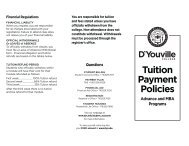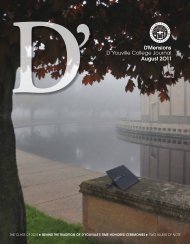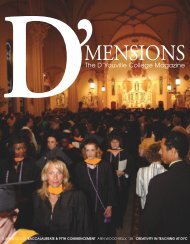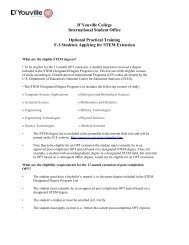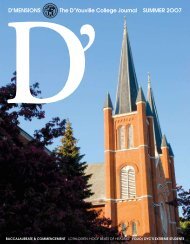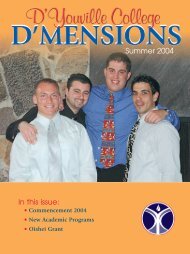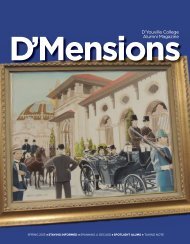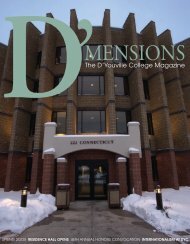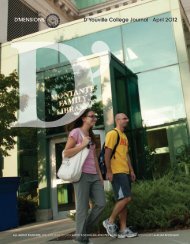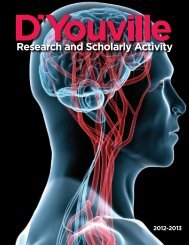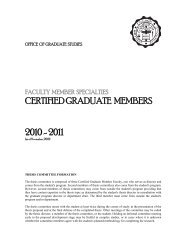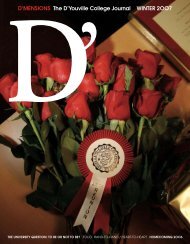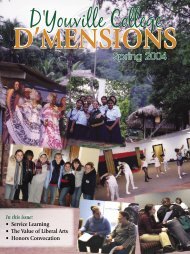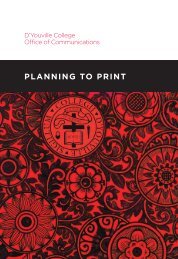d'mensions/the d'youville college Journal summer 2oo6
d'mensions/the d'youville college Journal summer 2oo6
d'mensions/the d'youville college Journal summer 2oo6
- No tags were found...
Create successful ePaper yourself
Turn your PDF publications into a flip-book with our unique Google optimized e-Paper software.
Faculty Post<br />
Accomplishments,<br />
Publications and<br />
Presentations<br />
Faculty at D’Youville have been extremely<br />
busy. In addition to <strong>the</strong>ir teaching responsibility,<br />
several have been successful in presenting<br />
at conferences and o<strong>the</strong>rs are now published<br />
authors.<br />
Drs. Carole Gutt and Judy Stanley<br />
Drs. Carole Gutt and Judy Stanley, department<br />
of nursing, presented at <strong>the</strong> poster session<br />
of <strong>the</strong> second annual ELNEC (End-of-Life<br />
Nursing Education Consortium) conference<br />
held in Atlantic City, N.J. Both Judy and Carole<br />
completed an ELNEC trainer certification<br />
program on end-of-life nursing care. They<br />
developed and are currently offering an<br />
undergraduate nursing course which, when<br />
completed, will provide certification on endof-life<br />
nursing care to enrolled students.<br />
Dr. Olga E. Karman<br />
Author and liberal arts professor, Dr. Olga E.<br />
Karman’s new book, Scatter My Ashes Over<br />
Havana, has been released. A memoir of her<br />
exile to <strong>the</strong> United States in <strong>the</strong> last 40 years<br />
reveals a portrait of feminine courage in <strong>the</strong><br />
face of political and personal adversity. Gustave<br />
Perez Firmat, a professor of humanities at<br />
Columbia University, reviewed <strong>the</strong> book<br />
saying, “Deeply felt and beautifully written,<br />
Olga Karman’s memoir undertakes a probing<br />
and unsentimental exploration of <strong>the</strong> high cost<br />
and moderate rewards of exile. A gem of a<br />
book.”<br />
Dr. Ruth Kelly<br />
Dr. Ruth Kelly presented a paper, “Isaac<br />
Hecker and <strong>the</strong> Catholic World, 1865-1867,” at<br />
<strong>the</strong> American Catholic Historical Association<br />
spring meeting, which was held at <strong>the</strong> College<br />
of <strong>the</strong> Holy Cross this year. Dr. Kelly serves<br />
on <strong>the</strong> editorial board of American Historians.<br />
The board has recently published a book with<br />
Palgrove Macmillan, Best Essays in American<br />
History, 2006.<br />
Dr. Merrily Kuhn<br />
A new member of <strong>the</strong> nursing faculty and a<br />
D’Youville College alum, Dr. Merrily Kuhn<br />
recently has been awarded her second doctoral<br />
degree, ND (naturopathic doctor) from<br />
Clayton College in Birmingham, Ala. She has<br />
recently presented papers at several meetings:<br />
Cardiovascular Workshop in Silverton, Ore.;<br />
“Critical Care–What’s New,” in Greeley,<br />
Colo.; and Nurse Anes<strong>the</strong>tics Spring Seminars<br />
in Nashua, N.H. She also presented in New<br />
York City and Rochester, N.Y., on medical<br />
error prevention and at seminars at <strong>the</strong> National<br />
Teaching Institute & Critical Care Exposition<br />
in Los Angeles, Calif., and at a cardiac<br />
symposium in New Orleans, La.<br />
Dr. Eric Little<br />
Dr. Eric Little, assistant professor of doctoral<br />
programs and director of <strong>the</strong> D’Youville<br />
College Center for Cognitive Science, has<br />
presented papers at several conferences:<br />
In Florence, Italy, at <strong>the</strong> 2006 Ninth<br />
International Conference on Multisource<br />
Information Fusion, “An Ontological Analysis<br />
of Threat and Vulnerability.”<br />
“The Need for Metaphysically Based<br />
Ontologies in Higher-Level Information<br />
Applications” in IFOMIS Report 14 (04-<br />
06), WSP2006: Contributions to <strong>the</strong> Third<br />
International Workshop on Philosophy and<br />
Informatics. The paper was presented in<br />
Saarbrücken, Germany.<br />
“Current Trends and Challenges in Ontological<br />
Research,” in Proceedings of <strong>the</strong> American<br />
Association of Information Science and<br />
Technology Annual Meeting in Charlotte,<br />
N.C.<br />
He also presented at <strong>the</strong> National Science<br />
Foundation in Washington, D.C., in June,<br />
Workshop on Geo-Spatial Ontologies.<br />
Dr. Margaret G. McGeachy<br />
Lonesome Words: The Vocal Poetics of <strong>the</strong><br />
Old English Lament and <strong>the</strong> African-American<br />
Blues Song, written by Dr. Margaret G.<br />
McGeachy, assistant professor of English, has<br />
just been published.<br />
L to r: Dr. Paul Johnson, professor of religious<br />
studies, Dr. Chalmers C. Clark, guest speaker and<br />
Dr. G. John Abbarno, professor of philosophy, at<br />
DYC symposium<br />
Ethics of Facial<br />
Transplantation Debated<br />
Dr. Chalmers C. Clark, Ph.D., visiting Fellow<br />
and lecturer, Center for Philosophy and History<br />
of Science, Boston University, addressed <strong>the</strong><br />
DYC audience at its spring Conversations<br />
in Liberal Arts Symposium on “What’s in<br />
a Word What’s in a Face Philosophy and<br />
Facial Transplantation.”<br />
Dr. Clark’s <strong>the</strong>sis was that whatever a “facial<br />
transplantation” is, it is not <strong>the</strong> transplantation<br />
of someone’s face. While this premise initially<br />
seemed paradoxical, it was shown that <strong>the</strong> idea<br />
of transplantation in medicine critically relies<br />
on our sense of “body part.” “The human face,<br />
however, is not such a body part,” Dr. Clark<br />
argued. The philosopher Wittgenstein, he<br />
pointed out, once wrote that “<strong>the</strong> face is <strong>the</strong> soul<br />
of <strong>the</strong> body.” Citing Peter Strawson’s concept<br />
of reactive attitudes and <strong>the</strong>ologian Martin<br />
Buber’s concept of “I-Thou” relationships,<br />
he stated, “The importance this has for<br />
medicine generally, is not a prohibition of such<br />
procedures as transplantation, but a caveat<br />
regarding <strong>the</strong> employment of technology when<br />
we are dealing with our psycho-cultural sense<br />
of who we are as persons ra<strong>the</strong>r than as physical<br />
parts of persons.”<br />
The Conversations in Liberal Arts series is<br />
sponsored by <strong>the</strong> liberal arts department and is<br />
under <strong>the</strong> direction of Dr. G. John Abbarno,<br />
professor of philosophy.<br />
11



